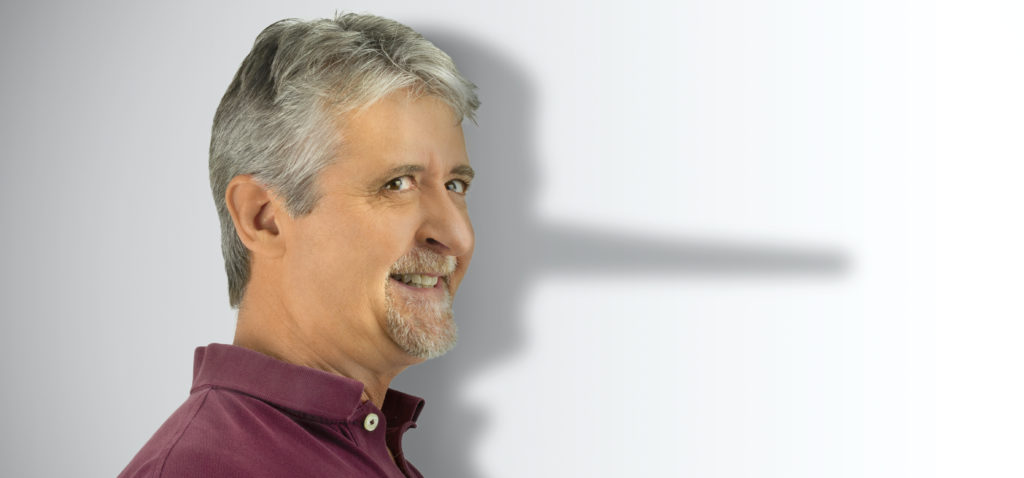Quick Hits
Daily brief research updates from the cognitive sciences

The one place that we can consistently catch people lying is in job interviews. And the question has long been how do you catch out these liars? The answer is you need to outsmart them.
But how?
Well lying uses cognitive resources. It is effortful because you have to construct an alternative narrative in your head and then keep this in your mind as you answer questions on this, or questions related to this. It is an effortful process. Therefore, if you can disrupt this process, you can uncover the liars.
Professor Aldert Vrij, from the Department of Psychology at the University of Portsmouth used this principle to design an experiment to outsmart liars. The way he did this is to give interview participants a cognitive task – this cognitive task means participants need to use cognitive resources and so this makes it much more difficult to tell a convincing lie and stick to this accurately.
The experiment had participants interviewed about societal topics, but they were instructed to either represent their own honest views or to lie about their views. They were also given time to prepare for this interview, giving them the ability to prepare elaborate and convincing lies. They were also incentivised by being entered into a prize draw. However, they were also given a 7-digit license plate number to remember. And some were told that if they failed to remember this, they would have an additional task of writing down their opinions after the interview.
What were the results?
They found that the additional cognitive tasks made the liars stories less plausible but, interestingly, only if this was considered important. This shows that if it is not considered important, they do not commit the cognitive resources to it, and so can lie more effectively.
So, to catch out liars you need to give them cognitive tasks that they will engage in, and this will inhibit their ability to construct plausible lies.
This can be done in interviews but may be a problem in every day life!●

Andy Habermacher
Andy is author of leading brains Review, Neuroleadership, and multiple other books. He has been intensively involved in writing and research into neuroleadership and is considered one of Europe’s leading experts. He is also a well-known public speaker speaking on the brain and human behaviour.
Andy is also a masters athlete (middle distance running) and competes regularly at international competitions (and holds a few national records in his age category).
Reference
Aldert Vrij, Haneen Deeb, Sharon Leal and Ronald P. Fisher.
The Effects of a Secondary Task on True and False Opinion Statement.
International Journal of Psychology & Behavior Analysis, 2022
DOI: 10.15344/2455-3867/2022/185
More Quick Hits
Unique Social Genes in Human Beings
Quick HitsDaily brief research updates from the cognitive sciences ne differentiating factor with human beings is our pro-sociality. This means we are a social species, and this sociality is seen in our ability to empathise, be socially tolerant,...
Want to Live Longer? Be Optimistic!
Quick HitsDaily brief research updates from the cognitive sciences e probably all know some people who are particularly pessimistic - always putting a negative side to things and expecting the worst outcomes. We probably also know some people who...
How Having Had COVID-19 Negatively Impacts Performance at Work
Quick HitsDaily brief research updates from the cognitive sciences ’m sure we’re all aware of the various negative aspects of having contracted COVID-19 such as long COVID but also the brain fog that seems to have been a feature that many people...
Narcissistic Leaders Block Knowledge Flow and Cooperation
Quick HitsDaily brief research updates from the cognitive sciences arcissism is considered one of the three dark-triad traits and something that has been reported as being common in senior leaders. The important question is can and does this hinder...
High Traffic Noise at School, Slower Cognitive Development
Quick HitsDaily brief research updates from the cognitive sciences ho would have thought that traffic noise could impact cognitive development of kids? Well according to this recent piece of research it can. Are you sure? Well, these researchers...
How Gratitude between Co-Workers Lowers Stress and Increases Performance
Quick HitsDaily brief research updates from the cognitive sciences ratitude is a nice thing to have, I think we all agree on that. But when it comes to the workplace some may see it is just being nice, and not being focused enough on the hard...






